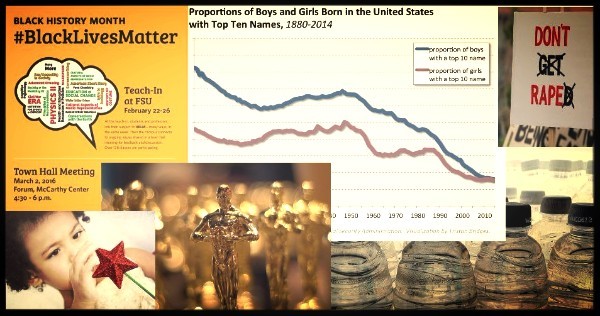
Hello hello! This week we have a slew of great new stuff on a wide array of current events, including diversity at the Oscars, environmental inequality in Flint, and working family policies across the country. Be sure to stop by or see below for more!
The Editors’ Desk:
“Religion and U.S. Elections: #TSP Politics.” This week, we highlight a classic white paper from our Politics volume by Joe Gerteis on the ties between religion and political power.
There’s Research on That!:
“There’s Something in the Water,” by Sarah Catherine Billups and Caty Taborda. Sociological research shows how the Flint water crisis is no fluke.
Discoveries:
“There’s No Fighting Without Rules,” by Neeraj Rajasekar. New research from Neil Gong shows how implicit norms regulate even the most rule-free spaces.
Clippings:
“Gender Affects Racial Identity,” by Amber Joy Powell. Lauren Davenport talks to NPR’s CodeSwitch about why women and girls are more likely to identify as multiracial.
“Tenure Track, Mommy Track,” by Allison Nobles. “According to sociologist Michelle Budig, high-income men get the biggest pay bump from having children in any job category, and low-income women lose the most.”
From Our Partners:
Contexts:
“More Oscars Diversity Won’t Solve Hollywood’s Whiteness Problem,” by Rachel King.
“Contexts Quicklit: 8 Agenda-Setting Articles on the Sociology of Rape,” by Nicole Bedera.
“Discrimination Against Queer-Perceived Women,” by Emma Mishel.
Council on Contemporary Families:
“Wake Up to Family Policy Impasses,” by Braxton Jones.
Scholars Strategy Network:
“Why Laws Targeting Non-Citizen Immigrants Affect Citizen Family Members and Associates, Too,” by Jane Lilly Lopez.
And a Few from the Community Pages:
- Feminist Reflections investigates why popular boy names are more popular than popular girl names.
- Cyborgology reflects on flea extermination and Amish women on the internet.
- Girl w/Pen discusses the challenges facing working women.
- Families As They Really Are reports on FSU’s innovative “teach-in”.

Comments